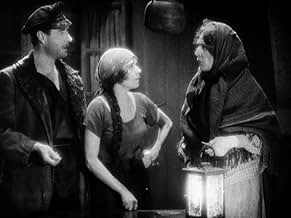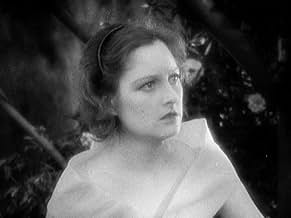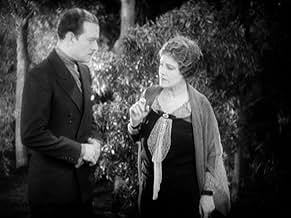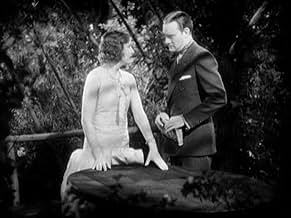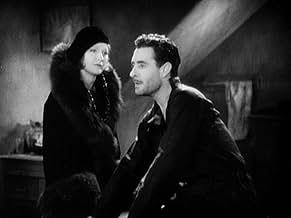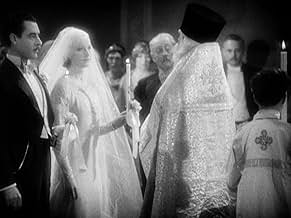Añade un argumento en tu idiomaFedya wins Lisa away from her fiance, Victor Karenin. But after Fedya weds Lisa, he becomes infatuated with a gypsy girl, Masha. His duplicity leads to tragedy.Fedya wins Lisa away from her fiance, Victor Karenin. But after Fedya weds Lisa, he becomes infatuated with a gypsy girl, Masha. His duplicity leads to tragedy.Fedya wins Lisa away from her fiance, Victor Karenin. But after Fedya weds Lisa, he becomes infatuated with a gypsy girl, Masha. His duplicity leads to tragedy.
- Dirección
- Guión
- Reparto principal
- Premios
- 1 premio en total
George Spelvin
- Magistrate
- (escenas eliminadas)
Richard Alexander
- Policeman
- (as Dick Alexander)
Charles Quatermaine
- Artimiev
- (escenas eliminadas)
Agostino Borgato
- Petushkov
- (escenas eliminadas)
Max Barwyn
- Trial Attendee
- (sin acreditar)
Stanley Blystone
- Undetermined Secondary Role
- (sin acreditar)
Geraldine Dvorak
- Anna Pavlovna's Maid
- (sin acreditar)
Reseñas destacadas
A good sound film for its time that should be absolutely fascinating to any silent-film buff. Look at the cast list and the director's name. This film positively teems with former silent-film *STARS* at the onset of sound productions.
Perhaps not surprisingly, I feel this film would have been better if produced silent. It certainly has the silent "look" and a silent "pace" to it.
While I think all the actors' voices sound good (even Gilbert's), their line deliveries are occasionally suspect--but not too bad.
All in all a decent (not excellent) early sound picture that should hold silent-film fans rapt till the end credits.
Perhaps not surprisingly, I feel this film would have been better if produced silent. It certainly has the silent "look" and a silent "pace" to it.
While I think all the actors' voices sound good (even Gilbert's), their line deliveries are occasionally suspect--but not too bad.
All in all a decent (not excellent) early sound picture that should hold silent-film fans rapt till the end credits.
"Redemption" is well-paced, competently directed, attractively cast, makes good use of off-screen sound (rain, birds, clock, singing, etc.) - but the story itself is slight and trite; one can only imagine that the Leo Tolstoy play on which it was based had more substance to it. Watchable. ** out of 4.
This film is often credited as another nail in the coffin of John Gilbert's career, part of Louis Mayer's plot to destroy one of MGM's biggest stars. In truth, this movie, based on a Tolstoy play, is dull and static, a photographed stage play with stagey performances and a lot of editing. Visually, it depends on cuts. There are only a few moving shots, and at least one of them, a pull-in tracking shot, could have been achieved in the editing room. Gilbert's performance is ... adequate, and his voice is a fine, deep baritone.... standard American dialect, a little nasal.
Did Mayer hate Gilbert that much? Mayer's pay was tied to MGM's profits, and he had objected to Gilbert's contract. It was immense, and some of the stories claim that his paycheck was agreed to at the New York office over his objections. It was known early on this movie was a dog. It had sat on the shelves, and Lionel Barrymore had shot some retakes before its release.
In the end, this movie failed, and Gilbert's career declined because his voice, while perfectly good, did not match the expectations of audiences from his silent vehicles, and his box office returns did not comport with his salary. Gilbert was not the only silent star whose career faltered or failed with the coming of sound. Why pay him $250,000 per picture, when a new actor could be hired for a small fraction of that, and not carry the baggage of a star persona which did not match the performance?
Gilbert was not the only person connected with this production whose career was harmed. Cameraman Percy Hilburn left MGM at the end of 1930 and was cinematographer on only one more movie. Director Fred Niblo directed his last movie in 1932. Co-star Rene Adoree made one more movie and was gone. Eleanor Boardman's movie career ended effectively in 1931. By the end of the year, Claire McDowell was appearing in uncredited bits. Everyone knows the story about Gilbert, but Hollywood was suffering financial ruin, and by 1936, MGM was the only major studio that was not in some form of receivership. If I had been Louis B. Mayer, looking at the returns on MGM's movies, I would have hated Gilbert too.
Did Mayer hate Gilbert that much? Mayer's pay was tied to MGM's profits, and he had objected to Gilbert's contract. It was immense, and some of the stories claim that his paycheck was agreed to at the New York office over his objections. It was known early on this movie was a dog. It had sat on the shelves, and Lionel Barrymore had shot some retakes before its release.
In the end, this movie failed, and Gilbert's career declined because his voice, while perfectly good, did not match the expectations of audiences from his silent vehicles, and his box office returns did not comport with his salary. Gilbert was not the only silent star whose career faltered or failed with the coming of sound. Why pay him $250,000 per picture, when a new actor could be hired for a small fraction of that, and not carry the baggage of a star persona which did not match the performance?
Gilbert was not the only person connected with this production whose career was harmed. Cameraman Percy Hilburn left MGM at the end of 1930 and was cinematographer on only one more movie. Director Fred Niblo directed his last movie in 1932. Co-star Rene Adoree made one more movie and was gone. Eleanor Boardman's movie career ended effectively in 1931. By the end of the year, Claire McDowell was appearing in uncredited bits. Everyone knows the story about Gilbert, but Hollywood was suffering financial ruin, and by 1936, MGM was the only major studio that was not in some form of receivership. If I had been Louis B. Mayer, looking at the returns on MGM's movies, I would have hated Gilbert too.
An irresponsible gambler, having destroyed the happiness of those dearest to him, seeks REDEMPTION in suicide.
According to cinematic legend, all the talkie MGM films starring John Gilbert were dreadful - the result of a bitter hatred between Gilbert (the highest paid star in Hollywood, with a $1.5 million contract) & studio boss Louis B. Mayer. A determination on Gilbert's part to fulfill the contract, and a campaign instituted by Mayer to destroy Gilbert's career including spreading the rumor that Gilbert's voice was 'high & feminine', culminated in several unwatchable movies.
Not entirely true. The Studio had a huge financial investment in Jack Gilbert and was not going to completely cut its own throat by showcasing him in nothing but dreck. However, of the 8 MGM talkies in which he appeared as solo star (1929 - HIS GLORIOUS NIGHT; 1930 - REDEMPTION; WAY FOR A SAILOR; 1931 - GENTLEMAN'S FATE; THE PHANTOM OF Paris; WEST OF Broadway; 1932 - DOWNSTAIRS; 1933 - FAST WORKERS) most were certainly rather ghastly.
Although released after HIS GLORIOUS NIGHT, REDEMPTION was Gilbert's first foray into talking pictures. He hated the film and begged the Studio not to release it, fearful of what it might do to his career. But release it they did, and coming after the atrocious reception of HIS GLORIOUS NIGHT, Gilbert's career was struck a mortal blow.
One of the main problems with REDEMPTION, aside from the turgid dialogue and dreadful editing, is that it is a depressing story, with wretchedly unhappy characters. This may have worked fine in Tolstoy's original novel (The Living Corpse), but for the cinema, especially dealing with the new difficulties engendered by sound, a morbid story line was deadly. To make matters worse, Gilbert tended to deliver his lines in a sing-song manner, which made them sound silly. Only in the Easter Monday Night scene does he get a few moments to show what he was capable of artistically.
The rest of the cast, Conrad Nagel, Eleanor Boardman & Renée Adorée, are also defeated by the film, although they speak their lines more naturalistically than Gilbert. The existing print of the film seems about 10 minutes short and what appears to be missing, based on Gilbert's final lines, would be the death of Adorée's character. (Movie mavens will recognize, in an uncredited role, silent comic Mack Swain playing an unfriendly Russian judge.)
Finally, about The Voice. There was nothing at all strange or unnaturally high about Gilbert's voice. As a matter of fact, it was of medium range & rather cultured & refined. Which was the crux of the problem, of course. While it is possible that no voice could have ever matched the perfect one viewers heard in their minds while watching his strong, virile silent roles, the reality was very different from what they wanted to hear (imagine Robert Montgomery's voice coming out of Clark Gable's mouth.) Gilbert was doomed from his first scene in his debut talkie; his war with Mayer only intensified the agony. John Gilbert would die in 1936, forgotten by most of his former fans, at the age of only 36.
According to cinematic legend, all the talkie MGM films starring John Gilbert were dreadful - the result of a bitter hatred between Gilbert (the highest paid star in Hollywood, with a $1.5 million contract) & studio boss Louis B. Mayer. A determination on Gilbert's part to fulfill the contract, and a campaign instituted by Mayer to destroy Gilbert's career including spreading the rumor that Gilbert's voice was 'high & feminine', culminated in several unwatchable movies.
Not entirely true. The Studio had a huge financial investment in Jack Gilbert and was not going to completely cut its own throat by showcasing him in nothing but dreck. However, of the 8 MGM talkies in which he appeared as solo star (1929 - HIS GLORIOUS NIGHT; 1930 - REDEMPTION; WAY FOR A SAILOR; 1931 - GENTLEMAN'S FATE; THE PHANTOM OF Paris; WEST OF Broadway; 1932 - DOWNSTAIRS; 1933 - FAST WORKERS) most were certainly rather ghastly.
Although released after HIS GLORIOUS NIGHT, REDEMPTION was Gilbert's first foray into talking pictures. He hated the film and begged the Studio not to release it, fearful of what it might do to his career. But release it they did, and coming after the atrocious reception of HIS GLORIOUS NIGHT, Gilbert's career was struck a mortal blow.
One of the main problems with REDEMPTION, aside from the turgid dialogue and dreadful editing, is that it is a depressing story, with wretchedly unhappy characters. This may have worked fine in Tolstoy's original novel (The Living Corpse), but for the cinema, especially dealing with the new difficulties engendered by sound, a morbid story line was deadly. To make matters worse, Gilbert tended to deliver his lines in a sing-song manner, which made them sound silly. Only in the Easter Monday Night scene does he get a few moments to show what he was capable of artistically.
The rest of the cast, Conrad Nagel, Eleanor Boardman & Renée Adorée, are also defeated by the film, although they speak their lines more naturalistically than Gilbert. The existing print of the film seems about 10 minutes short and what appears to be missing, based on Gilbert's final lines, would be the death of Adorée's character. (Movie mavens will recognize, in an uncredited role, silent comic Mack Swain playing an unfriendly Russian judge.)
Finally, about The Voice. There was nothing at all strange or unnaturally high about Gilbert's voice. As a matter of fact, it was of medium range & rather cultured & refined. Which was the crux of the problem, of course. While it is possible that no voice could have ever matched the perfect one viewers heard in their minds while watching his strong, virile silent roles, the reality was very different from what they wanted to hear (imagine Robert Montgomery's voice coming out of Clark Gable's mouth.) Gilbert was doomed from his first scene in his debut talkie; his war with Mayer only intensified the agony. John Gilbert would die in 1936, forgotten by most of his former fans, at the age of only 36.
John Gilbert's was in fine voice in Redemption, although the film itself was badly edited (particularly the opening scene of gypsies in a park) and more than a little morbid. It seems that MGM tries to undermine Gilbert by spreading negative rumors about his voice in hopes of getting out of their contract with them, which bound them to pay him ten (10) times per picture what he earned when Greta Garbo insisted that he be her co-star, after his MGM contract had ended, in 1933's Queen Christina.
And if anyone doubts that Louis B. Mayer had it in for Gilbert, just listen to the interview on this subject given years later by Hollywood Director King Vidor. And note that rather than putting both Garbo's and Gilbert's names above the title in Queen Christina, as had been done with their successful silent films, only Garbo was listed above the title. And their publicity for the film (eg its Posters) did not even list Gilbert among the cast.
In fact, Gilbert had a fine and interesting voice, which was perhaps too elegant and less casual than it might have been. His voice was deeper and more resonant than a number of the stars making their first sound films in 1929-30, eg. Douglas Fairbanks Sr. and Jr. and especially Charles Farrell, who truly had a high tenor voice, but nonetheless acted in Hollywood into the 1950s. Most comparable was Robert Montgomery's voice, which although a bit higher than Gilbert's was more casual.
Happily for us, John Gilbert made a total of 11 sound films and I particularly recommend The Phantom of Paris (1931), Downstairs (1932), Queen Christina (1933) and The Captain Hates the Sea (1934).
¿Sabías que...?
- CuriosidadesJohn Gilbert loathed the film and begged for it not to be released. His wishes were not granted. Instead the film was shelved and was released after His Glorious Night (1929), which had been filmed after "Redemption" was already finished.
- ConexionesFeatured in Hollywood (1980)
Selecciones populares
Inicia sesión para calificar y añadir a tu lista para recibir recomendaciones personalizadas
Detalles
- Duración1 hora 15 minutos
- Color
- Mezcla de sonido
Contribuir a esta página
Sugerir un cambio o añadir el contenido que falta

Principal laguna de datos
By what name was Redemption (1930) officially released in Canada in English?
Responde
